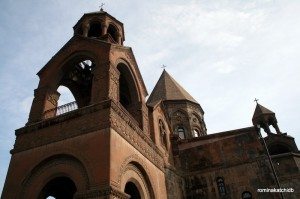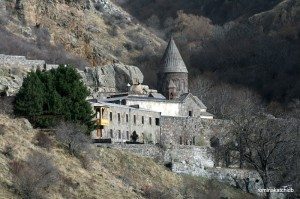You press the record button on your camera and through the viewfinder see the relic, an ancient spear bathing in golden light. You zoom in, pushing past its glass casing, and you realize you are inches away from the object that Christ felt tearing open his body.

You don’t know why, but at this one moment in your history, the thought of the spear’s existence, knowing you are looking at an object that touched the body of God, is overwhelming.
You begin to understand that perhaps the relic, validated through the lens of the camera we use to validate our modern lives, is actual, physical proof of the stories you believe with blind faith.
You realize why your people have kept this spear close to their hearts for centuries. Your people kept this relic inside the Geghart Monastery, a holy place carved out of the side of a mountain and named after the holy lance. Now, you’re looking at it at Etchmiadzin, the spiritual seat of the Armenian Church.
You have always wondered what motivated thousands of your ancestors and generations of your people to be so devoted to this one religion. You wonder why thousands upon thousands labored for countless years to built hundreds of churches and labored industriously copying holy manuscripts and entire Bibles by hand.
You’ve always questioned the devotion of your people to a religion that resulted in their repeated defeats, victimization, and attempted mass annihilation.
You realize that perhaps the first-hand stories of Jesus gave them the reason, and that your church—the first official Christian church in the world—was empowered directly by those who knew God the man. They were eyewitnesses to the miracles and created your Armenian Apostolic Church.
Inside Geghart, you feel the presence of God as the five angelic voices of the Garni Vocal Quintet reverberate through the stone structure. The words holy, mercy, and blessings spark spiritual neurons that lift your soul.
Holy is not something you feel with your five senses, but on this day, the abstract and ethereal ideas of spirit and faith become physical. Intellectual and spirituals concepts you cannot see, hear, or feel become measurable with the tingling of your skin, the acoustics of the room, and the tearfulness of your eyes.
You feel several feet closer to God and realize your whispered prayers can be heard and are heard clearly by the Maker.
Rewind your tape to Fri., Dec. 10, and you’re on an Aeroflot Airbus on your way to the homeland for a press junket on steroids. Seven days and six nights with stops at a dozen tourism destinations: Etchmiadzin, Lake Sevan, Dilijan, Noravank, Datev, Jermuk, and the capital city of Yerevan.
It’s an unexpected invitation from the Armenian Tourism Office, an invitation to return to the seat of the Armenian soul. The homeland is reaching out to tell the world about Armenia.

Even though you’ve been there a dozen times, even though you have spent countless months there reading the news about Armenia on a teleprompter, you have never been a travel writer.
Though you have imagined and dreamt about it, you have never had the opportunity to be your people’s Anthony Bordain, Samantha Brown, and Huell Howser. You’ve never toured the sites to videotape and report about what Armenia offers a world traveler.
From first-class hotel accommodations to the magical Wings of Datev—where the world’s longest aerial cable car brings the 9th-century monastery closer to the modern world—your journey is full of colorful images, incredible stories, and special people.
You meet trilingual Ph.D.’s intellectuals, repatriates, and common men and women, all magically dedicated to this small country.
You run into Peter Balakian, Dickran Kouymjian, and Boghos, the chef-turned-opera singer. You interview Salpi Ghazarian, the librarian-turned-nation builder, and Armen Devejian, an architect-turned-historian. You hear Pegor Papazian’s vision for a broadband network connecting all Armenia’s citizens, rural and metropolitan, to the world wide web.
You talk to grandmothers with stone-hardened faces about living hand-to-mouth. They stand in the cold for 10 hours a day, selling freshly baked bread at Geghart for a few bucks and still find a smile in their harsh reality to share with you.
You listen to rosy-cheeked men selling wine in Coca Cola bottles and watch prim and proper young men in their handsome uniforms opening hotel doors and serving you fancy coffee.
You hear stories dating back to Noah and the Ark, and learn about Armenian cuisine from master restauratuer Jirair Avanian at “Dolmama.”
You learn Armenian history from your expert tour guide, Naira Alaverdyan. You watch village women prepare your meal, and you taste the wines of Areni and the Armenian cognac of the Ararat Valley.
Before setting off for your long journey back, you think the best part of the trip will be helping your long-time friend and colleague, veteran Fresno news reporter and anchorwoman Stefani Booroojian, bring Armenia to Armenian and non-Armenian viewers of Fresno’s NBC affiliate.
Your bosses have been gracious enough to allow you, Stefani, and your videographer George Garnica step out of the newsroom mix for one week. You have their blessing to travel overseas and produce a series of reports about the ancestral homeland of some 60,000 Central Valley residents with Armenian surnames and the countless others who share the heritage but not their ancestors’ surnames or language.
Watching Stefani and George—and your other traveling mates Liana, Romina, Haik, Khatchig, Walter—see Armenia for the first time is the first highlight of your trip. You drink mulberry vodka together and push-start your stalled tour van on the road to Khor Virap.

Videotaping Stefani interview the head of the Genocide Memorial and Institute, watching her talk to women selling their homemade pomegranate wines, seeing George find souvenirs for his kids, all make Armenia new again.
Hearing the laughter and interaction of the group of journalists is what you think will make the press junket a productive and memorable one, especially as you drive from the southern end of Armenia, with the majestic monasteries at Datev and Noravank, to the northern end with the lush forests of Dilijan and clear waters of Lake Sevan.
Then comes that moment where the journey turns from a professional one to a personal and spiritual one.
Standing at the Treasury at Etchmiadzin, you find new meaning in the knowledge you had tucked away somewhere in your mind. You know that your church has ancient relics and important religious icons that connect your people to God’s human incarnations. But somehow these facts in your prior self had been mere trivia and tucked away in memory.
Standing in front of the spear and having a news camera from the U.S. record the historic weapon that had pierced the flesh of Jesus makes you realize how much more real Christianity had been to your forefathers.
Those who came before you had physical proof of Noah’s Ark. It was proof that had been brought down to Armenia from your people’s symbolic Mt. Ararat. Your people not only had the spear that pierced the body of Christ, but they had eyewitness accounts of the miracles of God on earth through the WikiLeaks of that age—the stories told by the Apostles in their own words.
Your religion was more than just 100 percent faith; it was as real as the soundbites you gather daily from the presidents of the United States, police detectives, and the ordinary citizens of Fresno.
When your nation accepted Christianity, the Apostles were as real and as true as the newsmakers whom you feature in your newscasts in the 21st century.
Your people had first-hand accounts from the Apostles who brought Christ’s stories to Armenia. The powerful accounts brought to Armenia by the Apostles Thaddeus and Bartholomew in AD 45 were so sacred that they inspired and healed a king and his nation two centuries later. They moved an entire people to accept the truth about God.
Like a modern-day California wildfire, your religion spread, inspiring Mesrob Mashdotz to create a unique alphabet to access the Bible. This new written language gave your people a set of rules to use in dealing with one another. This new Biblical life constitution in the Golden Age of Armenian literature set the ground rules on how to create a community, be humanitarian, care for the weak, the ill, and the elderly. It redefined justice, equality, honor, materialism, and fame.
You stand in the treasury and wonder why you have strayed from the core of your identity, from the religion that has kept your people focused on the real values of this world.
You wonder why you have given a secondary place in your heart to a religion that kept your people fighting when their homeland was invaded or from dissolving into the foreign societies when they were dispersed after the genocide.
You wonder why they held on to their identity at any cost when the Turks tried to erase you from your historic homeland by erasing a million-and-a-half of your ancestors.
You wonder why you don’t keep Christian ideas like gratitude and perseverance and faith in your daily battle against what seems to be an erratic and unstable world.
You ask yourself why you don’t remember at all times that there are godly reasons to the madness, even though your human mind may not grasp it until your death.
You wonder why you need the validation of others, of Facebook, or photo and television cameras.
Seeing Armenia again through the fresh set of eyes of your colleagues may have been what you expected, but your personal reincarnation at Etchmiadzin and your prayers at Geghart are what you will bring back home to Fresno.
You realize deep into your journey on steroids that every return to the source of your identity teaches you something new and allows you to discover yet another fiber in the skin that covers your soul.
You discover why your people were so devoted to Christianity for more than 17 centuries.
What will you discover on your next trip to Armenia? Will you meet someone who will change your life? Will you capture images with your still or video camera that will validate you and your lifetime? Will you touch someone’s life without knowing it? Will you create memories and laughter that will make you smile in the future? Will you bring back inspiring artwork that will brighten up your home for the years to come? Or will you be a new man having been to the place that gifted you with your identity?
And three apples fell from heaven: one for the storyteller, one for him who made him tell it, and one for you the reader.
Photos by Romina Der Bedrossian


My culture is my faith
Our religion could vanish our fate
There are many Christians around
We share the same religion
Can we share with them the same faith?
Hence to say,
“My Culture is My Religion…My Faith.”
Paul, your words continue to inspire me. Thanks again for sharing your profound thoughts.
This was a great reflection, thanks for sharing. One small question. You said “You’ve always questioned the devotion of your people to a religion that resulted in their repeated defeats, victimization, and attempted mass annihilation…” I believe that, although being Christian may have been a cause for some of our persecution, more often it gave meaning to our difficult existence and redeems it through the death and resurrection of our Lord Jesus Christ…